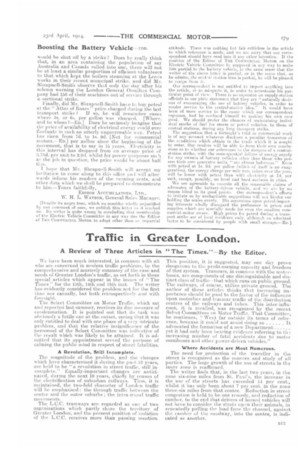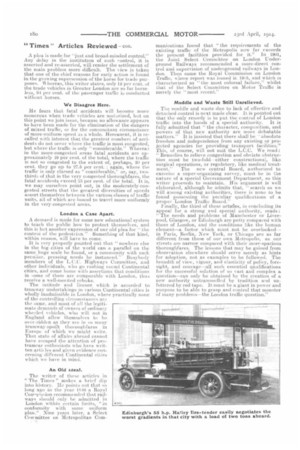Traffic in Greater London.
Page 7

Page 8

If you've noticed an error in this article please click here to report it so we can fix it.
A Review of Three Articles in "The Times." By the Editor.
We have been much interested, in common with all who are concerned in modern traffic probleme, by the comprehensive and masterly summary of the ease and needs of Greater London's traffic, as set forth in three special articles which appear in the issues of " The Times "for the 13th, 14th and 15th inst. The writer has evidently considered the problem not for the first time nor casually, but both retrospectively arid with foresiglit.
The Select Committee on Motor Traffic, which sat and reported last summer, receives its due measure of condemnation. It is pointed out that its task was obviously a futile one at the outset, seeing that it was only entitled to deal with one phase of a very intricate problem, and that the relative insignifivance of the personnel of the Select Committee was indicative of the result which was likely to be attained. It is admitted. that its appointment served the purpose of calming the public mind in respect of street fatalities.
A Revolution, Still Incomplete.
The magnitude of the problem, and the changes which have characterized it during the past 10 years, are, held to be "a revolution in street traffic, still incomplete." Equally-important changes are anticipated, during the next 10 years, chiefly by reason of the electrification of suburban railways. Thus, it is maintained, the two-fold character of London traffic will be emphasised : the through traffic between the centre and the outer suburbs ; the intra-mural traffic movements.
The L.C.C. tramways are regarded as one of two organizations which partly share the territory of Greater London, and the present position of isolation of the L.C.C. receives more than passing mention. This position, it is suggested, may one day prove dangerous to the profit-earning capacity and freedom of that system. Tramcars, in common with the motorbuses, are components of one distinguishable and distinct class of traffic—that which runs on public ground. The railways, of course, utilize, private ground. The author of these articles thinks that increasing importance should be paid to the factor of the influence upon motorbus and tramcar traffic of the distribution centres of the railways and tubes. This inter-influence, it is recalled, was recognized by the recent Select Committees on Motor Traffic. That Committee, he continues, " Went far outside its terms of refer ence, because it could not avoid doing so It advocated the formation of a new Department yet it had only been hearing evidence referring to ilia increasing number of fatal accidents due to motor omnibuses and other power-driven veh icles."
Where Accidents are Most Numerous.
The need for protection of the traveller iii the street is reccgnized as the concern and study of all parties. The huge growth of the use of streets in the inner zone is reaffirmed.
The writer finds that, in the last two years, in the zone six-nine miles from St. Paul's, the increase in the use of the streets has exceeded 14 per cent., whilst it has only been about 7 per cent-. in the zone three-six miles from that centre. Reduction in street congestion is held to be one remedy, and reduction of camber, to the end that drivers of horsed vehicles will not have to consider the strain upon their animals, in repeatedly pulling the load from the channel, against the camber of the roadway, into the centre, is indicated as another. A plea is made for "just and broad-minded control." Any delay in the institution of such eontrol, it is asserted and re-asserted, will render the settlement of the main problem more difficult, The view is taken that one of the chief reasons for early action is found in the growing supersession of the horse for trade purposes. Whereas, this writer states, only 12 per cent. of the trade vehicles in Greater London are so far horseless, 94 per cent, of the passenger traffic ie conducted without horses.
We Disagree Here.
lie fears that fatal accidents will become more numerous when trade vehicles are motorized, but on this point we join issue, because no allowance appears to have been made for the elimination of the dangers of mixed traffic, or for the concomitant. circumstance of more-uniform speed as a whole, Hereanent, it is recalled with interest that the greatest number:, of accidents do not ()Nair where the traffic is most congested, but where the traffic is only " considerable." Whereae in the more-congested areas fatal accidents are approximately 19 per cent. of the total, where the traffic is not so congested to the extent of, perhaps, 20 per cent, they go up to 27.5 per cent. ; again, where the traffic is only classed as " considerable," or, say, twothirds of that in the very congested thoroughfares, the fatal accidents exceed 33 per cent. of the total. It is, we may ourselves point out, in the moderately-congested streets that the greatest diversities of speeds assert themselves between the various classes or traffic units, all of which aye bound to travel more uniformly in the very-cougested areas.
London a Case Apart.
A demand is made for some new educational system to teach the public how to protect themselves, and this is but another expression of our old plea. for 'the control of the pedestrian." Something of that kind, within reason, will have to come.
It is very properly pointed out that " nowhere else in the ing.cities of the world can a parallel on the same huge scale be found, or a community with such peculiar, pressing needs be instanced." Busybody members of the L.C.C. Highways Committee, and other individuals, who go rushing round Continental cities, and come home with. assertions that conditions in some of them are comparable with London, thus receive a well-merited rebuke.
The latitude and licence which is accorded to tramway undertakings in various Continental cities is wholly inadmissible in London, where practically none of the controlling circumstances are the aame, and most of all the legitimate demands of owners of ordinary wheeled vehicles, who will not M England allow themselves to be over-ridden as they are in so many tramway-spoilt thoroughfares in Europe of which we might write. That state of affairs abroad cannot have escaped the attention of protramcar enthusiasts who have written a,rtit les and given evidence concerning different Continental cities which we have in mind.
An Old Ideal.
The writer of these articles in " The Times " makes a brief dip into hietory. He points out that So long ago as the year 1810 a Royal Coteeeission recommended that railways should only he admitted in London within certain limits, " in conformity with some uniform plan." Nine years later, a Select Committee on Metropolitan Com
• " munieations found that "the requirements of the existing traffic of the Metropolis now far exceeds the present facilities provided for it." In 1901, the Joint Select Committee on Lendon Underground Railways recommended a more-direct control and supervision of underground railways in London. Then came the Royal Commission on London Traffic, whose report was issued i 1905, and which is characterized as " the most colossal failure," whilst that of the Select Committee on Motor Traffic is merely the "most recent."
Muddle and Waste Still Unrelieved.
The muddle and waste due to lack of effective and detached control is next made clear. It is pointed out that the only remedy is to put the control of London traffic into the hands of a special authority. It is fully admitted that "the character, composition, and powers of that new authority are more debatable matters." It is insisted that there shall be " absolute freedom and independence from any existing or projected agencies for providing transport facilities." This, of course, will not suit the L.C.C. We read : " Remedies to relieve congestion and obviate obstruction must be two-fold—either constructional, like surgical operations, or regulatory, like medical treat ment." The new central Board, authorized to exercise a. super-organizing survey, must be in the nature of a special Government Department, so this writer proceeds to maintain. His argument is well elaborated, although he admits that, " search as we will among existing authorities, there is none to be found possessing the peculiar qualifications of a proper London Traffic Boiled.'
Finally, the third of these articles, in concluding its appeal for a strong and special authority, reads : " The needs and problems of Manchester or Liverpool, Glasgow, or Edinburgh are petty compared with those of London, and the conditions like the human element—a fa.etor which must not be overlooked.-in Paris, Berlin, New York, or Chicago are as far different from those of our own Metropolis, as our streets are narrow compared with their more-spacious thoroughfares. The lessons that may be gained from observation elsewhere should serve merely as hints for adoption, not as examples to be followed. The breadth of view, vigour, and elasticity of policy, foresight, and courage—all such essential qualifications for the successful solution of so vast and complex a question—can only be obtained by the creation of a new authority untrammelled by tradition and unfettered by red tape. It must be a giant in power and purpose to be able to grasp and control that monster of many problems—the London traffic question."


























